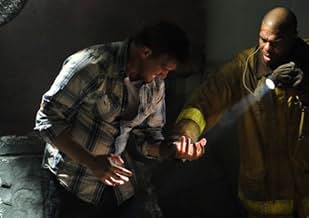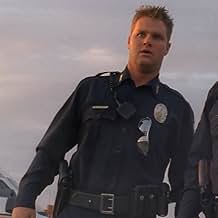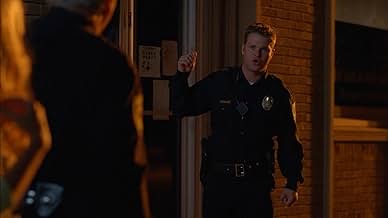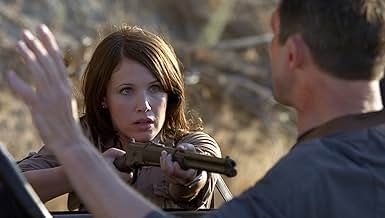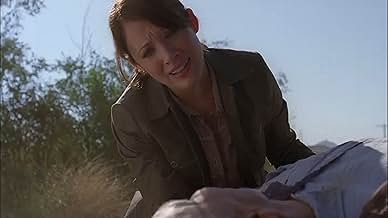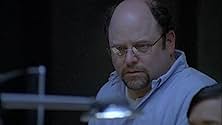AVALIAÇÃO DA IMDb
4,2/10
2,4 mil
SUA AVALIAÇÃO
Adicionar um enredo no seu idiomaTwo episode television mini-series covering a meteor, Kassandra, heading to Earth on a collision course, an "extinction level event".Two episode television mini-series covering a meteor, Kassandra, heading to Earth on a collision course, an "extinction level event".Two episode television mini-series covering a meteor, Kassandra, heading to Earth on a collision course, an "extinction level event".
Explorar episódios
Enredo
Você sabia?
- CuriosidadesTodas as entradas contêm spoilers
- Erros de gravaçãoAfter the meteor hit the command bunker the phone lost connection and died, later just before the other meteor was to hit the earth and they were about to launch the rockets, the phone connection was miraculously in perfect working order.
Avaliação em destaque
This miniseries gets off to a good start. No wasting time with the usual getting to know all the characters and their irrelevant plot lines. Right away, we see that in Mexico, Dr. Lehman and Imogene O'Neil discover that the asteroid Kassandra, 60 miles across, is headed straight for Earth after a collision with a comet knocks it off course. Not to mention the fact that debris from the collision is about to rain down on Earth causing chaos of biblical proportions. The asteroid itself, of course, is the main concern (no, despite the title, it's not a meteor)-- life on Earth will end if Dr. Lehman is right and the asteroid cannot be stopped.
Dr. Chetwyn (who fired Dr. Lehman because he was a nut) gets a disturbing phone call in the middle of the night. Yes, it's that urgent. The country (actually, the world) has only days to stop doomsday. A group of military and scientific experts get together somewhere in the desert. Wait, don't Russia and China have a stake in this ... ?
Then the miniseries starts wasting time on irrelevant plot lines.
Most of the characters have some connection with the small town of Taft, California--and, in fact, except for Central Command, all the action is taking place in Taft by the last 20 minutes. Taft is the one location on land that gets hit by a meteor in the first round (specifically, the Hapscomb farm), and its citizens are the unfortunate victims of a disproportionate number of hits later on. Taft Police Chief Crowe has a son Jack who is an LAPD detective. The younger Crowe's partner Det. Calvin Stark has gone off the deep end after suffering a loss, and he wants everyone, especially Det. Crowe, to know how he feels. Det. Stark's crime spree claims almost as many victims as the meteors, if you only count those who appear on screen. Also, Det. Crowe's daughter Jenny is on her way to the family's isolated vacation cabin with her boyfriend.
Dr. Lehman and Imogene have to return to the United States! Only they--yes, only they!--know what's going on and how to predict where Kassandra will hit. And the obstacles that must be overcome for the other scientists and the military to get this vital information--unbelievable! Only in a satire of disaster movies could the writers have come up with this many difficulties. The scientists and the military can't even be CONTACTED? REALLY?
One of the more interesting story lines involves the Hapscomb family. The mother is a doctor at the hospital, and her son Michael just happens to be around when another one of the meteors hits. And there is a third meteor and a fourth by the time it's all over. That's just in Taft. The second and third meteors give us an interesting rescue situation. Meteor number four also produces some excitement. Those are just the ones we see hitting Taft.
I did mention the disaster reached biblical proportions. On the news they say the recovery could cost trillions. Thousands are already dead and we still have the big threat coming.
And every possible obstacle standing in the way of stopping it. The climax is very exciting and will keep you guessing right until the very end. Not the very end of the miniseries, because there's about five minutes left after the action is all over.
Getting off the subject of the meteors and Kassandra, the Det. Stark story might have made a good movie in and of itself. Michael Rooker does a pretty good job as the insane cop. But for the most part, his story is just plain irrelevant.
Despite its problems, this movie features a number of fine actors. Christopher Lloyd does his usual quality work as Dr. Lehman, but he's not on enough. I'm not sure what to say about Jason Alexander. He received lots of praise as a bumbling moron with low self-esteem and a temper. Therefore, I think it's fair to say he does a good job here. Yes, I do mean the world is relying on George Costanza to save it. Getting back to Dr. Lehman being fired: I said above "he was a nut." Read it carefully. No, I don't think I made a mistake.
Stacy Keach gives the standout performance. With good material, I think it would have been Emmy caliber. He still manages to be better than what he is given, and he makes the miniseries worth seeing.
Ernie Hudson also does a good job as the general in charge of destroying Kassandra. The poor man. And there's an Asian lieutenant who at least has good writing. Plus she's cute.
Other good performances come from the actors playing a Mexican truck driver, a border official named Murphy, and an old woman with a rotary phone and a son in the military.
Marla Solokoff (as Imogene) is pretty to look at. She has a couple of good scenes. Actually, if you just want to laugh at her troubles (it's tempting), I guess she has a lot of good scenes.
The visual effects are better than average for TV. I'm not sure the sheer size of Kassandra is really communicated, but the detail is magnificent. I'll bet it looks good on a big screen.
The military fires nearly everything they have at just the meteors (but save some for Kassandra!), and that's pretty impressive to watch. Some of them get through, and the catastrophic damage to big cities sure looks real. Actually, it's no worse than some of our more destructive hurricanes.
We are told where everything is by what appear to be satellite photos which start out showing a large area, and then the camera appears to zoom in on the exact location. It's effective, I suppose, but I found it annoying.
It's not a total disaster, despite its problems.
Dr. Chetwyn (who fired Dr. Lehman because he was a nut) gets a disturbing phone call in the middle of the night. Yes, it's that urgent. The country (actually, the world) has only days to stop doomsday. A group of military and scientific experts get together somewhere in the desert. Wait, don't Russia and China have a stake in this ... ?
Then the miniseries starts wasting time on irrelevant plot lines.
Most of the characters have some connection with the small town of Taft, California--and, in fact, except for Central Command, all the action is taking place in Taft by the last 20 minutes. Taft is the one location on land that gets hit by a meteor in the first round (specifically, the Hapscomb farm), and its citizens are the unfortunate victims of a disproportionate number of hits later on. Taft Police Chief Crowe has a son Jack who is an LAPD detective. The younger Crowe's partner Det. Calvin Stark has gone off the deep end after suffering a loss, and he wants everyone, especially Det. Crowe, to know how he feels. Det. Stark's crime spree claims almost as many victims as the meteors, if you only count those who appear on screen. Also, Det. Crowe's daughter Jenny is on her way to the family's isolated vacation cabin with her boyfriend.
Dr. Lehman and Imogene have to return to the United States! Only they--yes, only they!--know what's going on and how to predict where Kassandra will hit. And the obstacles that must be overcome for the other scientists and the military to get this vital information--unbelievable! Only in a satire of disaster movies could the writers have come up with this many difficulties. The scientists and the military can't even be CONTACTED? REALLY?
One of the more interesting story lines involves the Hapscomb family. The mother is a doctor at the hospital, and her son Michael just happens to be around when another one of the meteors hits. And there is a third meteor and a fourth by the time it's all over. That's just in Taft. The second and third meteors give us an interesting rescue situation. Meteor number four also produces some excitement. Those are just the ones we see hitting Taft.
I did mention the disaster reached biblical proportions. On the news they say the recovery could cost trillions. Thousands are already dead and we still have the big threat coming.
And every possible obstacle standing in the way of stopping it. The climax is very exciting and will keep you guessing right until the very end. Not the very end of the miniseries, because there's about five minutes left after the action is all over.
Getting off the subject of the meteors and Kassandra, the Det. Stark story might have made a good movie in and of itself. Michael Rooker does a pretty good job as the insane cop. But for the most part, his story is just plain irrelevant.
Despite its problems, this movie features a number of fine actors. Christopher Lloyd does his usual quality work as Dr. Lehman, but he's not on enough. I'm not sure what to say about Jason Alexander. He received lots of praise as a bumbling moron with low self-esteem and a temper. Therefore, I think it's fair to say he does a good job here. Yes, I do mean the world is relying on George Costanza to save it. Getting back to Dr. Lehman being fired: I said above "he was a nut." Read it carefully. No, I don't think I made a mistake.
Stacy Keach gives the standout performance. With good material, I think it would have been Emmy caliber. He still manages to be better than what he is given, and he makes the miniseries worth seeing.
Ernie Hudson also does a good job as the general in charge of destroying Kassandra. The poor man. And there's an Asian lieutenant who at least has good writing. Plus she's cute.
Other good performances come from the actors playing a Mexican truck driver, a border official named Murphy, and an old woman with a rotary phone and a son in the military.
Marla Solokoff (as Imogene) is pretty to look at. She has a couple of good scenes. Actually, if you just want to laugh at her troubles (it's tempting), I guess she has a lot of good scenes.
The visual effects are better than average for TV. I'm not sure the sheer size of Kassandra is really communicated, but the detail is magnificent. I'll bet it looks good on a big screen.
The military fires nearly everything they have at just the meteors (but save some for Kassandra!), and that's pretty impressive to watch. Some of them get through, and the catastrophic damage to big cities sure looks real. Actually, it's no worse than some of our more destructive hurricanes.
We are told where everything is by what appear to be satellite photos which start out showing a large area, and then the camera appears to zoom in on the exact location. It's effective, I suppose, but I found it annoying.
It's not a total disaster, despite its problems.
- vchimpanzee
- 20 de jul. de 2009
- Link permanente
Principais escolhas
Faça login para avaliar e ver a lista de recomendações personalizadas
- How many seasons does Meteor have?Fornecido pela Alexa
Detalhes
- Data de lançamento
- País de origem
- Central de atendimento oficial
- Idioma
- Também conhecido como
- Meteor: Path to Destruction
- Locações de filme
- Empresas de produção
- Consulte mais créditos da empresa na IMDbPro
Contribua para esta página
Sugerir uma alteração ou adicionar conteúdo ausente



